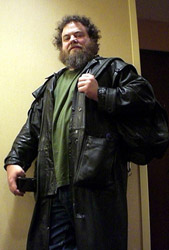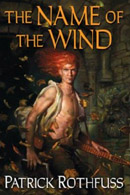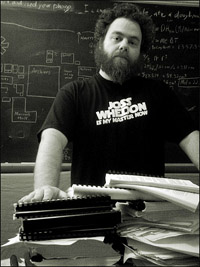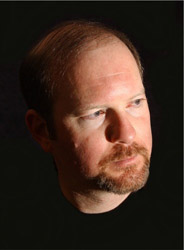
ShadowDance: You've written in many established worlds – StarCraft, Star Wars, The X-Files, Dune etc. What constraints does such writing set and are there any perks in it that are not present when one writes in universes created by himself?
Kevin Anderson: When writing in an established universe the most important part is to be true to the characters, follow the rules established in the original movie or TV show, and make your work "feel" like another adventure in that world. Sometimes, the owners of the francise are very easy to work with and want to be creative with the author; other times, they are very restrictive. I have had good luck with most of my forays – in almost every instance, the owners (Lucasfilm, Chris Carter of the X-Files, Blizzard Entertainment for StarCraft, etc.) approached *m
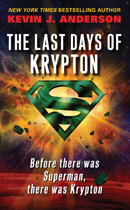 e* to do the work, so they were already familiar with my writing. I find the job very enjoyable, and it really challenges my skills as a writer.
e* to do the work, so they were already familiar with my writing. I find the job very enjoyable, and it really challenges my skills as a writer.SD: How does the writing process go when you write under a contract for a book in another world, and when you write books in your own worlds? Which is faster/easier to write?
KA: There are more steps in the approval process when writing books in an established universe – I have to submit a detailed outline so that the owner can read and OK it before I start writing. For my own works – such as Saga of Seven Suns – I am the person who makes all the decisions. Neither is fast or easy to write, but each has its advantages and disadvantages. For Seven Suns, I could make everything up, but then I have an enormous amount of work to check facts and be consistent from one book to the next over the course of seven volumes. For something like Star Wars, there are a great many reference books, so I can get a specific answer – but then I have to follow it.
SD: Are you a big fan of any of the worlds for which you have written?
KA: Of course. Writing a novel is a very ambitious process requiring a lot of creative energy and enthusiasm. I could not devote my imagination, my time, or the hard work of writing a novel to something I didn’t love. I enjoyed Star Wars from its first release in theaters decades ago; I watched X-Files every week on TV even before Chris Carter contacted me; Dune has always been my favorite science fiction work of all time.
SD: The Dune prequels and sequels, written with Brian Herbert, have met with mixed feelings from readers and critics. How much did you intend for the new books to resemble Frank Herbert's original Dune series and what changes did you want to make?
KA: Well, that’s a somewhat unbalanced picture. Our Dune books have sold millions of copies in over a dozen languages worldwide, and there are maybe a hundred fans on the internet who have complained about them. We have received thousands of fan letters since the first book was published, and we receive 27 positive fan letters for every unfavorable letter. That’s about a 97% approval rating, and you’d be hard-pressed to find another series to match that. Our books have received the highest critical honors and have won or been nominated for many major awards.
Frank Herbert meant to write more Dune books, and unfortunately he did not survive to complete his work. Brian and I are not Frank Herbert, and we have never tried to copy his style or claim to be his equal. Frank Herbert is one of the greatest geniuses in the science fiction field and wrote the most incredible science fiction novel ever. However, Brian and I are telling more Dune stories, reawakening worldwide interest in the series, and filling the need. We have our own writing style, and we feel we have added a great deal to the Dune canon. We have introduced an entirely new audience to the books who had never before read Frank Herbert’s masterpieces.
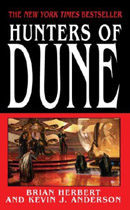
SD: Which of the Dune books was hardest to write and why? For which did you have the least material from Frank Herbert to work with?
KA: Hunters of Dune and Sandworms of Dune were the most difficult because – ironically, it might seem – we had Frank Herbert’s outline and his specific direction of where he envisioned the story going. Frank’s later books in the Dune series (Heretics and Chapterhouse) are very different in tone from the original novel, and many readers had difficulty with them. We had to reconcile those books with the other books in the series, follow Frank’s roadmap even in cases where we might have wanted to make the plot go differently, and tell a great story that *all* Dune fans would enjoy. It posed a lot of challenges.
We had the least direct material for the Butlerian Jihad trilogy, since that was "ancient history" in the Dune universe and we had only Frank Herbert’s general historical outline.
SD: In their attempts to actually start getting things done, many authors think up all sorts of rituals before sitting down to write. Do you have any such rituals?
KA: You’re assuming I ever *stop* writing! I like to start fresh in the morning. I exercise every day, shower, have coffee and breakfast, and then I get started as soon as I can, looking over my outlines of the chapters for the day, and then I write. I don’t have any special ritual, though.
SD: Do you have a specific place where it's easiest for you to write? And what writing tool do you use generally – you've said you often "write" into a dictaphone. Does that change the manner in which you compose/express the sentences/scenes in your head?
KA: I am a storyteller, and I love to talk about my characters, the settings, the plot twists and adventures. To me, the words come naturally when I speak them aloud, because I have trained myself to "talk" the sentences in my head, rather than type them, as most people do. I live in a very beautiful area in the Rocky Mountains, and I enjoy getting my exercise, hiking along trails, and dictating my chapters (which a typist then transcribes). I find that far superior to sitting in a chair and typing all day.
SD: You mostly write series. Has, at any point, a world in which you've written a lot of books gone "stale" for you? What would you do if that happened? Would you keep writing?
KA: Fortunately, even when I work on a long-standing series (7 books in the Saga of Seven Suns, 11 books so far in Dune, 54 total projects for Star Wars), I also have other stories in the works. This allows me to keep it fresh by switching from one book to another, letting me "recharge
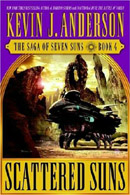 my batteries" in one universe while I am finishing a novel set in another. If I ever found my energy waning for a particular series, and I wanted to keep writing there, I would concentrate on other projects for a while to give that part of my brain a rest, and then tackle it with renewed enthusiasm.
my batteries" in one universe while I am finishing a novel set in another. If I ever found my energy waning for a particular series, and I wanted to keep writing there, I would concentrate on other projects for a while to give that part of my brain a rest, and then tackle it with renewed enthusiasm.SD: To what extent the opinion of readers/critics about a part of a series of yours has influenced the writing of the next part?
KA: You have to separate the real fans from the ones who just have an axe to grind and are going to complain, no matter what. The fans who say "I’ve hated every single book in this series, and I hate the new one even more!" are just making themselves look foolish and you can’t take them seriously.
I just finished traveling for 27 days to do talks and signings for Paul of Dune, meeting fans in 19 different cities around the US. I make many appearances at libraries, bookstores, and science fiction conventions, so I have a chance to talk with an overwhelming number of fans. I listen to their impressions, the things they are most excited about, the things they don’t like. By the time a novel is published, however, I have usually already completed the next book in the series, but I always listen to their comments and factor it into my plans for upcoming work.
SD: Which of your books do you consider the most successful and which one made you feel like you were at the peak of your abilities?
KA: I think that would have to be the Saga of Seven Suns – since it is one continuous story, it really counts as a single "book." I worked more than seven years on my life on this series, and I think it’s my masterpiece. I have never before conceived of such a vast, interconnected epic, and I do believe it turned out as well as I could have hoped.
SD: Your Saga of the Seven Suns series has been compared to some epic fantasy series. Why do you think is that and did you intend to create such impressions in the readers?
KA: That was definitely my intention. I have seen the very popular continuing fantasy epics of Robert Jordan, Terry Goodkind, Terry Brooks (I don’t know if they are successful in Bulgaria, but they’re extremely popular in the US), and I wanted to do the same thing in science fiction, which is my favorite genre. In its format, Seven Suns is indeed like a fantasy, with different planets instead of different kingdoms, alien races instead of elves or dwarves, and it has the sweeping politics, battles, mythology, and a cast of characters like a fantasy novel.
SD: Saga of the Seven Suns is mostly described as a "space opera" kind of SF, which isn't a very widespread trend nowadays. Do you try to consciously challenge the conventions of the space opera in some way in your books and are you aware of them and the history of this "sub-genre" as you write, or you just write what you like?
KA: Space opera is enjoying a greatly renewed popularity in the US and UK, and my Saga of Seven Suns are bestsellers there, particularly in Australia and New Zealand. I think by modeling the giant story after a huge fantasy epic – which readers love – I have attracted an audience that might be turned off by the rather dense and indecipherable SF that some authors write.
This series is like my love letter to the genre, incorporating all the wonderful things I enjoy in science fiction – galactic empires, alien races, exotic planets, strange artifacts, sinister robots, space battles, and interesting ideas.

SD: How interested are you in the science part when writing "Science" Fiction novels?
KA: My university degree is in physics and astronomy, so I have a scientific background. However, I am most interested in telling stories set against a background of a vast and imaginative universe. I’m not writing a technical paper.
SD: What do you think of writing workshops?
KA: I had a workshop of professional writers when I was beginning my career and I received a lot of great critiques. I still use a close group of test readers to make comments on every one of my manuscripts, because I benefit from a fresh set of eyes. You need to be careful, though, to surround yourself with a group of other people who are serious about writing. I have seen workshops where the other members just talk and never get around to finishing anything. Those sorts of workshops are a waste of your time.
SD: Could you share an advice you think important for aspiring authors (apart from "work hard and don't give up")?
KA: Work hard and don’t give up – that really and truly is the most important part. Becoming a professional author is very much equivalent to becoming a professional athlete in a major sports team. You have to practice and practice and never stop trying to get better, and as you improve, you will see other areas to work on.
SD: What is your stand on the question of fanfics? Do you think it is a flattering practice, or you tend to dislike?
KA: The fans who write fanfic are obviously dedicated to a particular series. If they didn’t love it, why put all their energy into creating new works? However, there are copyright issues involved, and they can’t try to publish those works professionally. I wrote Star Trek fanfic when I was much younger and I learned a lot from the practice. But then I extended that to writing my own original material, which is how I became a successful writer.
SD: Do you wish to share something with your Bulgarian readers?
KA: Only my thanks to them. I know that very few American novels are translated and published in Bulgaria, and I have been very lucky that so many of my titles have been picked up by Bulgarian readers. I hope you keep reading, and enjoying – and I hope I can one day visit your country.
